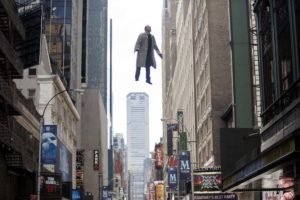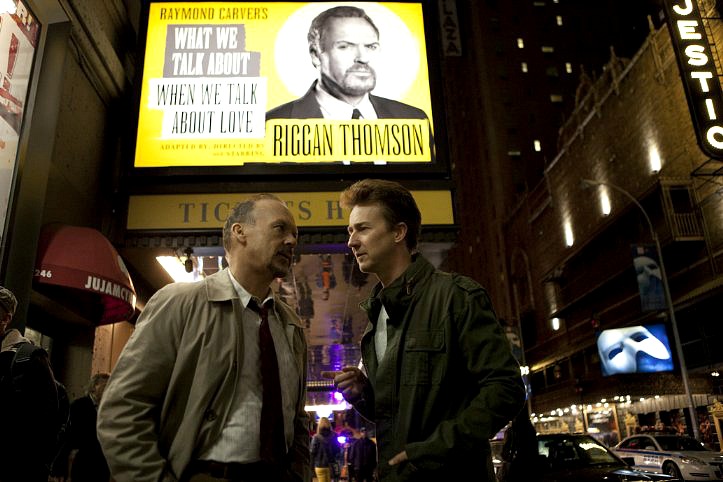Directed By: Alejandro González Iñárritu
Written By: Alejandro González Iñárritu, Nicolás Giacobone, Alexander Dinelaris and Armando Bo
Starring: Michael Keaton, Edward Norton and Emma Stone
Rated: R
Grade: A
Art imitates life and then some in Alejandro González Iñárritu’s stunning new film Birdman, a layered and metatextual exploration into the psyche of a man scraping rock bottom while trying desperately to take flight. The director and co-screenwriter’s previous fascination with manipulative gloom (21 Grams, Babel, Biutiful) has shifted mercifully toward wry surrealism, as Birdman reaches dizzying new heights for cast and crew alike. Swooping into the narrowest depths of emotional and existential crisis, this eccentric, farcical character study uncovers wrenching aspects of regret and resentment all while maintaining a satirical whimsy that will spin many viewers’ heads straight into the clouds.
Oh, and it’s also absurdly, savagely funny.
 Much has already been made of Michael Keaton’s star turn as washed-up actor Riggan Thomson, best known for headlining a beloved superhero franchise 20 years ago. Sound familiar? It should. Although Keaton has insisted repeatedly that any resemblance between his post-Batman career trajectory and Riggan’s inability to clip Birdman’s wings is purely coincidental, it’s hard to deny it’s also awfully convenient.
Much has already been made of Michael Keaton’s star turn as washed-up actor Riggan Thomson, best known for headlining a beloved superhero franchise 20 years ago. Sound familiar? It should. Although Keaton has insisted repeatedly that any resemblance between his post-Batman career trajectory and Riggan’s inability to clip Birdman’s wings is purely coincidental, it’s hard to deny it’s also awfully convenient.
The parallels between artist and subject only aid Birdman’s self-referential precision, as Keaton’s go-for-broke gusto aligns masterfully alongside Riggan’s attempt to reinvent himself with a Broadway adaptation of Raymond Carver’s short story “What We Talk About When We Talk About Love.” The risky project is Riggan’s last-ditch effort to pluck Birdman’s feathers once and for all, but obstacles both physical and psychological plague the production and, ultimately, his sanity with equal measure. Keaton’s portrayal of a onetime cultural icon scrambling for post-millennial relevance rings true thematically and personally, and the cacophony of praise surrounding his performance is beyond deserved. It’s required viewing.
Birdman’s opening scene depicts Riggan levitating in a shabby dressing room at the St. James Theatre, his meditative nirvana interrupted by a gravelly inner monologue confused with this newfound search for serenity and street cred. Just who does Riggan think he is? The odd, quietly powerful sequence sets a perfect tone for Riggan’s dual existence in reality and fantasy, the movie following suit with jaw-dropping technical achievements and narrative prowess. Chronicling the play’s final stages of evolution from first preview to opening night, Birdman unfolds like an extended dream sequence, floating through time and space with intimate nuance and unrelenting ambition that extend well past its curtain call.
Incredible camerawork from cinematographer extraordinaire Emmanuel Lubezki (Gravity, Children of Men) envelops the film with such seamless fluidity it appears to have been shot almost entirely in one take, but it’s dynamic editing duo Douglas Crise and Stephen Mirrione who keep the magic a secret. Conversely, a staccato, propulsive drum score courtesy of jazz percussionist Antonio Sánchez perfectly illustrates Riggan’s throbbing internal conflict and sends it shooting far beyond the marquee lights and straight into the proverbial gut.
 Riggan is a simmering cauldron of bundled nerves and intermittent coherence, as consistent visits from a certain winged alter ego chip away at his ability to assert control over increasingly dysfunctional surroundings. Despite the questionable presence of sudden telekinetic powers and unshakable hallucinations, Riggan’s troubles aren’t all a figment of his imagination.
Riggan is a simmering cauldron of bundled nerves and intermittent coherence, as consistent visits from a certain winged alter ego chip away at his ability to assert control over increasingly dysfunctional surroundings. Despite the questionable presence of sudden telekinetic powers and unshakable hallucinations, Riggan’s troubles aren’t all a figment of his imagination.
A swaggering stage icon replaces the play’s second male lead at the eleventh hour, threatening Riggan’s creative authority and exacerbating his already-prevalent insecurity. As Method actor Mike Shiner, Edward Norton joins in on the sardonic fun, ribbing his own reputation as an egotistical perfectionist with gleeful aplomb. Emma Stone’s scorched-earth turn as Sam, Riggan’s obstinate daughter and personal assistant, adds a welcome balance of youthful wisdom and prickly naïveté to an otherwise hopelessly, hilariously neurotic character ensemble. Her scenes with Norton atop the St. James roof nearly fly away with the whole heart of the film. The fact these two are also alumni of comic-book blockbusters (Norton had a notoriously ill-fated turn in 2008’s The Incredible Hulk, and Stone currently portrays Amazing Spider-Man squeeze Gwen Stacy) only adds further winking insight into Birdman’s impressively detailed, albeit esoteric, subtext.
Naomi Watts and Andrea Riseborough nail their supporting roles as Mike and Riggan’s estranged girlfriends and co-stars, respectively, while Amy Ryan makes her fleeting screen time count as Riggan’s ex-wife with lingering investments. Finally, Zach Galifianakis ditches the dopey sidekick act (well, almost) and rounds out the playbill as Riggan’s loyal but understandably exasperated lawyer and producer.
As if that weren’t enough, a crusty, anti-Hollywood theater critic (Lindsay Duncan) is circling Riggan like a bespectacled vulture, promising him she’ll shut down “What We Talk About When We Talk About Love” with merely a few terse paragraphs. “You’re no actor,” she sneers, penning her reviews from the bottom of a martini glass. “You’re a celebrity.”
 Ouch. While Birdman’s overlapping intentions may evoke other notable backstage dramas, particularly the deceptive eloquence of All About Eve and the flashy psychosis of Black Swan, its surgical deconstruction of our present culture’s relentless obsession with fame is what will mark its place in cinematic history. Mike warns Riggan, “popularity is the slutty little cousin of prestige,” but it’s Sam’s frustration with her dad’s refusal to participate in social media that has her convinced his comeback is doomed. “You hate bloggers, you mock Twitter, you don’t even have a Facebook page,” she spits, indirectly likening Riggan to a 21st century Norma Desmond. “You’re the one who doesn’t exist!” Riggan can neither argue nor acquiesce, and even the movie’s exhilarating final scene leaves Sam’s accusation profoundly ambiguous.
Ouch. While Birdman’s overlapping intentions may evoke other notable backstage dramas, particularly the deceptive eloquence of All About Eve and the flashy psychosis of Black Swan, its surgical deconstruction of our present culture’s relentless obsession with fame is what will mark its place in cinematic history. Mike warns Riggan, “popularity is the slutty little cousin of prestige,” but it’s Sam’s frustration with her dad’s refusal to participate in social media that has her convinced his comeback is doomed. “You hate bloggers, you mock Twitter, you don’t even have a Facebook page,” she spits, indirectly likening Riggan to a 21st century Norma Desmond. “You’re the one who doesn’t exist!” Riggan can neither argue nor acquiesce, and even the movie’s exhilarating final scene leaves Sam’s accusation profoundly ambiguous.
Just see it.
There are no stones left unturned in Birdman. The game cast’s willingness to embrace such difficult and self-deprecating material while also delivering performances of incredible range and effect speak to the film’s larger achievement as a genre-bending examination of humanity, art, commerce and, yes, love in the digital age. It’s nothing short of a pure thrill to behold. As we close in on another awards season, prepare to see Birdman soar. Movies like this are exactly what we talk about when we talk about Oscars.
Follow Erin on Twitter @ErinBiglow.
Images courtesy of Fox Searchlight

